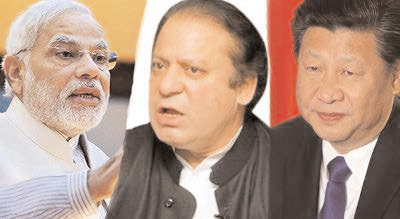WASHINGTON (TIP): China and Pakistan are closely coordinating moves to block India‘s entry into the Nuclear Suppliers Group (NSG).
Beijing is using Pakistan’s non-starter position with the NSG to block India’s application in the name of parity, stating that it would either support NSG entry for both India and Pakistan, or none of them.
Talking about the China – Pakistan grand strategy to stall India’s admission into the NSG , well placed US sources who work with the NSG said that from all counts it does appear that China and Pakistan are coordinating closely to stop the Indian entry.
The sources pointed to the fact that when India sought an information session with the NSG Participating Governments (PGs) at the recent NSG Consultative Group meeting on April 25 and 26, where it would have made a formal presentation to the NSG Group in support of its membership, Pakistan requested for a similar discussion slot with the NSG PGs.
Sources said that even though Pakistan was fully aware that its request would be rejected, it made its application at the cue of China, in order for Beijing to look even-handed when it sought the rejection of both requests on grounds of parity.
Providing an insight into the China-Pakistan plan to stall India, sources say that Pakistan is now going to write to all the NSG PGs about its wish to join the NSG. This is being done in anticipation of an application by India for NSG membership at the forthcoming plenary session of the NSG in June.
The Pakistani application, added sources, is “just a decoy” for China to reject both applications on grounds of parity. China knows that Pakistan does not stand a chance at the NSG, and most of the NSG states will reject Islamabad’s application. By taking the lead in rejecting the Pakistani application along with that of India, China would like to project its position as “neutral” when in reality it is “working in tandem with Pakistan to stall India’s application “.
US sources are disappointed with the Chinese tactics of “using Pakistan’s non credentials with the NSG to settle scores with India”. Informed sources say that this strategy is not a secret and during Pakistan President Mamnoon Hussain’s visit to China in November 2015, China revealed its hand when it told President Hussain that if India is allowed to get NSG membership, China would ensure that Pakistan also joins the group.
The Chinese government told President Hussain that “if India is allowed to join the NSG and Pakistan is deprived of NSG membership, Beijing will veto the move and block the Indian entry”.
Sources maintain that true to its word, China is following a plan that will enable it to use Pakistan’s non-acceptance at the NSG to block India’s acceptance. “It is both or none” is the Chinese plan to derail the Indian application, say sources.
Chinese officials at the NSG level have been using the Pakistan card to stop India’s entry into the NSG while appearing to be even handed in China’s relations with India. Well informed sources also point to comments made by Pakistan’s former permanent representative to the United Nations Zamir Akram who virtually admitted the grand China – Pakistan plan to stall India’s entry into the NSG when, he said, that India will not make it to the NSG despite US. support since China was committed to both India and Pakistan joining the NSG at the same time, and would block any move for a unilateral admission of India.
He added that chances of India gaining entry into the NSG are virtually nil. The former senior Pakistani official also made it known that Islamabad has “friends at the NSG” who won’t let India enter the group.
US sources have seen through China’s game of “either both or none” in the NSG. They say that India’s non-proliferation credentials can never be compared with Pakistan’s, as Pakistan has a history of “selling Nuclear technology to rogue states like Libya”. They point to the father of Pakistan’s nuclear bomb, Dr A.Q. Khan, and his global nuclear trade.
Added to this history, is the fear in the West that Pakistan’s nuclear weapons, especially the tactical version that it is now in the process of developing, can easily find their way into the hands of terrorists, as Pakistan’s nuclear command is extremely vulnerable to penetration by Islamic hardliners. Well-placed sources say that China is aware of this situation, and is mindful of the fact that Pakistan can never be considered for membership in any global nuclear club, but that won’t stop China from using Pakistan as a “parity token to stop India which is fast emerging as China’s competitor at a global level”. (ANI)
